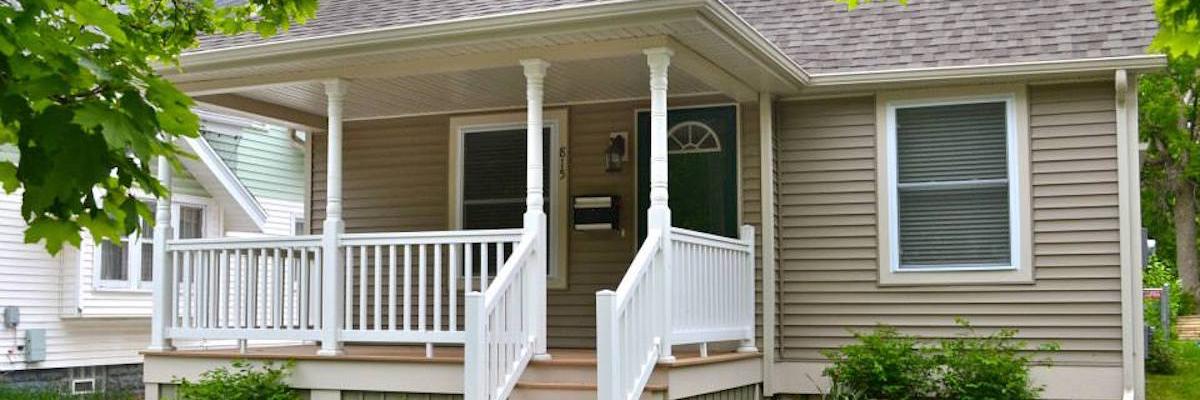
What is the Hardest Hit Blight Elimination program?
The City of Lansing and Ingham County Land Bank recently received $6 million in federal funding to administer the Hardest Hit Blight Elimination Program. The funding for this program comes from the U.S. Department of Treasury’s Hardest Hit fund and is being administered in Michigan by the Michigan State Housing Development Authority (MSHDA).
The Hardest Hit Blight Elimination program provides $25,000 total per property that can be used for the acquisition, abatement of hazardous materials, and demolition of identified and certified blighted residential properties owned by the Land Bank in the City of Lansing. While the Land Bank does have the ability to purchase privately owned, blighted properties through the program, it is not likely that many properties will be purchased due to time constraints and costs.
How many homes will be demolished?
The $6 million received provides funding for approximately 240 demolitions of blighted residential structures in Lansing.
What is blight? Why demolition?
Blight refers to properties that are in a state of disrepair and attract undesirable or unlawful activity, which negatively impacts homeowners and neighborhoods by reducing property values and draining local government resources. Blighted, vacant and abandoned homes are a serious issue for Ingham County homeowners, neighborhoods and communities.
By demolishing these blighted structures, the goal is to stabilize property values and surrounding neighborhoods. It would require a significant number of more resources to maintain and clean these properties than to remove them.
Why is the Land Bank demolishing these properties?
All of the properties on the list for demolition are currently owned by the Land Bank. Through careful assessment, experienced Land Bank staff determined that these properties are in need of demolition due to structural or other significant physical deficiencies. Requirements of the Hardest Hit Blight Elimination program say that each property must be certified as blighted and that the certification is made by a licensed builder. Each of the properties on the list has been certified as being blighted by the Land Bank’s Construction Manager, who is a licensed builder.
How does this program define blight?
In order to be eligible for this program, each property must be certified as being blighted. Blighted structures are defined through this program as:
-
Considered a public nuisance according to local code or ordinance.
-
Is a nuisance because of age, physical condition or use.
-
Has had utilities, plumbing, heating, or sewage disconnected, destroyed, removed or rendered ineffective so that the property is unfit for the intended use.
Where can I see the list of properties?
A list of properties can be acquired from the Land Bank. The Land Bank also intends to include a list of properties in the program on its website – www.inghamlandbank.org. This should be made available on the website by early summer 2015.
What is the timeline for this project?
The program started in February 2015 and has an 18-month duration. Actual demolitions should commence in July 2015, with the program ending in late summer 2016. The Hardest Hit Blight Elimination Program requires that 25% of the funds be spent in the first six months of the program and 70% must be spent within the first 12 months of the program.
Is there flexibility in which properties are listed for demolition?
Yes, the Land Bank would like to hear from neighborhoods about properties believed appropriate or inappropriate for demolition. This feedback process could possibly result in a property being added to or removed from the list.
Can someone purchase a home listed for demolition?
These homes have been certified as blighted and would require a significant amount of money to bring them up to code. If someone is interested in purchasing and rehabilitating one of the properties with this in mind, they could contact the Land Bank Sales Team at 517-267-5221 to discuss.
Will adjacent neighbors be notified prior to the demolition of a nearby house?
Neighborhood notification is required under the City of Lansing’s demolition permit process. Adjacent property owners and property owners on both sides of the block of the proposed activity shall be notified 72 hours prior to the commencement of demolition work. In addition, all adjacent neighbors will be sent a notification letter approximately six weeks in advance of the demolition. Acceptable methods of notification include direct mail, door hangers or fliers.
Can items be salvaged from a home prior to demolition?
Selective salvaging of useable items in the home prior to demolition will be done by Land Bank personnel where appropriate and possible. Because of the funding requirements and strict timeline of the program, a full-scale deconstruction of homes will not be able to occur.
Will hazardous materials such as asbestos be removed prior to demolition?
Yes, all homes will be surveyed for asbestos and hazardous materials. Any such material deemed present through these surveys will be removed/abated prior to demolition.
What will be done with the lot after demolition?
Land Bank staff will develop a post-demolition plan for each of the listed properties. There are three possibilities for post-demolition lots:
- Sell to adjacent homeowner. First priority would be to a homeowner occupant.
- Bank or hold on to the property for future development. This option makes the most sense for neighborhoods that are close to transit, the Downtown area, parks, schools and other amenities or along main corridors.
- Turn to gardened lots through the Land Bank Garden Program. This is a good short to mid-term strategy for a property if the long-term strategy is redevelopment.
The Land Bank will work with the community to determine best post-demolition plans for the lots.
Who will own the lot after demolition?
The Land Bank will continue to own the lot until it is sold to the adjacent property owner or redeveloped and sold. The Land Bank is responsible for the maintenance of properties it owns (mowing, trash/debris removal, etc.).
Can someone purchase the lot after demolition?
Yes. Lots will be available for purchase if it is determined sale of the lot is the best strategy for post- demolition. Interested parties would work with the Land Bank Sales Team by calling 517-267-5221.
Will basements be removed or filled?
All basements will be completely removed and filled with Class II fill. The lot will be graded with topsoil and seeded for grass.
Will utility lines remain?
Electrical will be cut off by the Board of Water and Light and Consumers Energy will disconnect gas at the house prior to demolition. The City of Lansing will not grant a demolition permit until documentation that utilities have been disconnected and retired are provided.
Who should I talk to if I have concerns?
Please call or email Land Bank Executive Director Jeff Burdick at 517-267-5221 or jburdick@ingham.org.
